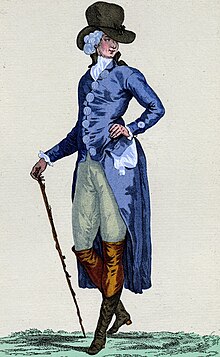|
Put on airs To put on airs, also give airs, put in airs, give yourself airs, is an English language idiom and a colloquial phrase meant to describe a person who acts superior, or one who behaves as if they are more important than others.[1][2][3] OriginIt is derived from the French word "air", meaning appearance, and was first used in the 1500s.[4] Variations of the phrase were used throughout the 1700s.[5] The phrase appears in the 1911 Dictionary of French and English by John Bellows. It appears under the entry for the French word poseur meaning to pose,[6] and more specifically "poseur: a person who pretends to be what he or she is not: an affected or insincere person".[7] HistoryThe phrase is derived from the French word "air" which meant appearance or look. The phrase has been in use since the 1500s.[4] To "Give Airs" was also referred to as a fake way of acting.[8] "Put on" is in modern emphatic use means: "to assume deceptively or falsely; to feign, affect or pretend."[9] The phrase appears in the records of the 1661 Witchcraft trial of Florence Newton. It was said that a woman named Mary Longdon, "...believed her position gave her the right to airs and graces".[10] It is considered an English Language idiom.[1] The phrase was used in a published book from the 1700s, Put in Airs.[8] The term was used in a book from 1759 by George Farquhar The Constant Couple "...when she puts on her airs, as you call it."[5] The phrase appears also in 1776 in a book by Francis Beaumont called Humorous Lieutenant: "You can give yourself Airs sometimes..."[11] Amidst the United States Civil War, in 1864, a minstrel song (a genre now considered to be racially offensive) with a chorus and eight verses was published. It includes these lyrics: "Oh! white folks listen, will you now, this darkey's going to sing -.," and including two verses about personal vanity, followed by five on various Union Army's victories over the Confederacy, concluding: "Now where's this boasted chivalry, who sport the Stars and Bars? / Why they're learning from our Yankee boys the way to put on airs."[12][13] It has been variously defined as for example, in an 1869 textbook says: "Put on a counterfeit appearance"[14] An 1882 dictionary says: "To put on airs, to assume airs of importance."[15] Another more modern usage: "put on airs and graces to behave affectedly."[16] Typified by false claims of mastery, superiority or pretense.[17][18] Putting on airs is an example of divergence behavior, that can be, acting in a contrary way to dissociate oneself from their peers. It is similar to acting boorishly at a wedding reception.[19] See alsoReferences
Look up put on airs in Wiktionary, the free dictionary. |